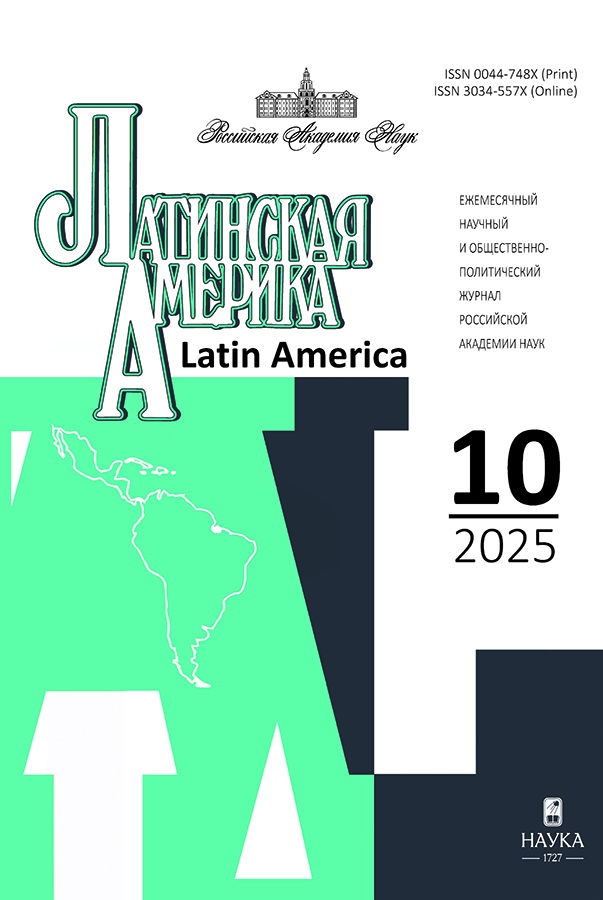Brazil's financial and technological leadership. The results of a 5-year revolution in the banking sector
- Authors: Stepnov I.M.1, Kovalchuk J.A.2
-
Affiliations:
- Financial University under the Government of the Russian Federation
- Market Economy Institute Russian Academy of Sciences
- Issue: No 4 (2024)
- Pages: 26-40
- Section: Economy
- URL: https://ruspoj.com/0044-748X/article/view/667940
- DOI: https://doi.org/10.31857/S0044748X24040027
- ID: 667940
Cite item
Abstract
5 years ago Brazil was a country with an extremely monopolized structure of the banking sector. The existing problems in the banking sector (limited operations without physical presence, the inaccessibility of bank branches to the population from remote areas of the country), combined with the spread of the Internet and smartphones and the accelerated penetration of digital technologies during the pandemic, contributed to breakthrough development of FinTech companies offering affordable and simple digital financial and investment services. Brazil has become a country of FinTech leadership both in Latin America and in the world – it has reached a share of 15% of global online transactions and ranks 2nd in the world after South Korea in terms of the number of mobile transactions per capita, and 2 times more mobile fast payments are made here daily than in India, with the difference in population more than a billion people. The article analyzes the prerequisites of the Brazilian FinTech revolution and the dynamics of the FinTech industry and assesses the limitations and prospects for development, taking into account the significant role of the state in the digital transformation in the country and the stimulation of private business in the financial sector, the creation of digital banking ecosystems and the support of healthy market competition.
About the authors
Igor M. Stepnov
Financial University under the Government of the Russian Federation
Email: stepnoff@inbox.ru
ORCID iD: 0000-0003-4107-6397
Doctor of Economics, Professor at Department of Corporate Finance and Corporate Governance Leningradsky Prospekt 49/2, 125167 Moscow, Russian Federation
Julia A. Kovalchuk
Market Economy Institute Russian Academy of Sciences
Email: fm-science@inbox.ru
ORCID iD: 0000-0002-9959-3090
Doctor of Economics, Professor, Leading Researcher Nakhimovsky Prospekt 47, 117418 Moscow, Russian Federation
References
- Яковлев П.П. Тренды, меняющие экономику стран Латинской Америки. Контуры глобальных трансформаций: политика, экономика, право. М.,2022, Т. 16, № 1, сс. 77-101.
- Школяр Н.А. Цифровая трансформация Латинской Америки. РСМД, 2022.
- Семенов В.Л. Бразильский путь в инновационную экономику. Латинская Америка. М., 2022, № 10, cc. 6-22.
- Асяева Э.А., Мягкова Ю.Ю. Обзор цифровой финансовой повестки Бразилии. Известия ВУЗов ЭФиУП. 2023, №3 (57).
- Симонова Л.Н. Горизонт 2040. Взгляд из Бразилии. Часть 1. Экология, климат и технологии. Латинская Америка. М., 2023, № 7, cc. 6-22.
- Смаль С.В. Государственная политика цифровизации в странах Латинской Америки. Опыт применения многомерных интегральных индексов на примере Бразилии. Латинская Америка. М., 2021, № 4, cc. 40-55.
- Пономарев Е.А., Симонова Л.Н. Цифровой суверенитет, вызовы и риски цифровизации в Латинской Америке. Латинская Америка. 2023, № 11, cc. 6-22.
- Strange, A., Oliveira, F., Brazil’s surprising fintech tailwind. Andreessen Horowitz, 2023. Available at: https://a16z.com/brazils-surprising-fintech-tailwind/ (accessed: 22.12.2023).
- Brasil recupera el liderazgo Fintech en América Latina y supera la barrera de las 370 startups. Finnovista, 2022. Available at: https://www.finnovista.com/radar/brasil-recupera-elliderazgo-fintech-en-america-latina-y-supera-la-barrera-de-las-370-startups/ (accessed: 23.12.2023).
- Lessons to be learned from FinTech adoption in Brazil. EY FS Insights, 2018. Available at: https://www.ey.com/en_sa/financial-services--emeia-insights/lessons-to-be-learned-from-fintechadoption-in-brazil (accessed: 25.12.2023).
- FinTech – Brazil Outlook. Statista market forecast. Statista, 2023. Available at: https://www.statista.com/outlook/dmo/fintech/brazil (accessed: 25.12.2023).
- Felippe, G. Future of the national financial market: Moment of innovation by FinTechs in transformation to the national banking environment. Revista Científica Multidisciplinar Núcleo Do Conhecimento, 2022. Available at: https://www.nucleodoconhecimento.com.br/accounting/financial-market (accessed: 25.12.2023).
- Latin America Digital Transformation Report 2023. Atlantico Investing Fund, 2023. Available at: https://www.atlantico.vc/latin-america-digital-transformation-report-2023 (accessed: 26.12.2023).
- Brazil – Overview 2023. The World Bank Data, 2023. Available at: https://data.worldbank.org/country/BR (accessed: 25.12.2023).
- Digital Transformation in Latin America: 5 trends to know. Vantiva, 12.01.2024. Available at: https://www.vantiva.com/resources/digital-transformation-in-latin-america-5-trends-to-know/ (accessed: 12.01.2024).
- Global Fintech market Report and Forecast 2024-2032. Expert Market Research, 2023. Available at: https://www.expertmarketresearch.com/reports/fintech-market (accessed: 23.12.2023).
- Ranking of largest fintech companies in 2022 [Full List]. CFTE, 2023. Available at: https://courses.cfte.education/ranking-of-largest-fintech-companies/?_ga=2.170190376.9429 62545.1631026255-1594612315.1630590050 (accessed: 23.12.2023).
- Revolucion Fintech y El Fondo Soberano de Brasil y el futuro de las finanzas. Faster Capital. 2023. Available at: https://fastercapital.com/es/contenido/Revolucion-Fintech--El-Fondo-Soberano-de-Brasil-y-el-futuro-de-las-finanzas.html (accessed 23.12.2023).
- Novillo, S.G. Finnovating Analysis Brazil FinTech Landscape 2023. Finnovating, 2023. Available at: https://finnovating.com/news/fintech_brazil_analysis_2023/ (accessed: 23.12.2023).
- FinTech – Brazil – Revenues. Statista market forecast, 2023. Available at: https://www.statista.com/outlook/dmo/fintech/brazil#transaction-value (accessed: 23.12.2023).
- Baria, S. Goldman Sachs: Brazil fintech sector to generate $24B amid 10-year growth surge. S&P Global Market Intelligence, 2019. Available at https://www.spglobal.com/marketintelligence/en/news-insights/trending/2qhdvhvgj1yjibxu-ua39g2 (accessed: 24.12.2023).
- ¿Por qué Brasil le lleva la delantera al resto de América Latina en materia de innovación en el sector financiero? Infobip, 2022. Available at: https://www2.infobip.com/es/blog/por-que-brasille-lleva-la-delantera-al-resto-de-america-latina-en-materia-de-innovacion-en-el-sector-financiero (accessed: 24.12.2023).
- Pix. Banco Central do Brasil, 2021. Available at: https://www.bcb.gov.br/en/financialstability/pix_en (accessed: 26.12.2023).
- Barnett, G. Meet TED and DOC. Brazil Counsel, 2022. Available at: https://www.brazilcounsel.com/blog/meet-ted-and-doc (accessed: 26.12.2023).
- Capurro, M. E., Sims, S. PIX Mobile Payment: How Brazil’s central bank launched platform. Bloomberg, 2021. Available at: https://www.bloomberg.com/news/articles/2021-10-06/pixmobile-payment-how-brazil-s-central-bank-launched-platform?srnd=premium&sref=CIpmV6x8 (accessed: 26.12.2023).
- Колесникова Т.В., Степнов И.М. Цифровая трансформация Латинской Америки и китайский фактор в формировании трендов. Латинская Америка. М., 2023, № 12, сс. 34-48.
Supplementary files










